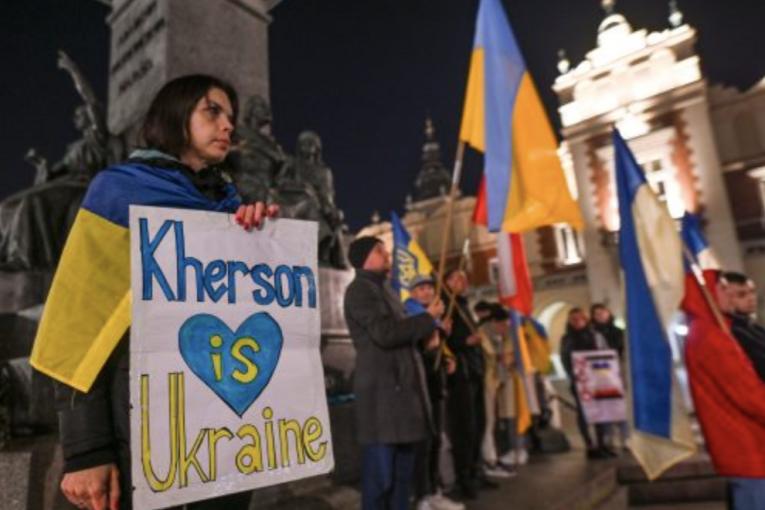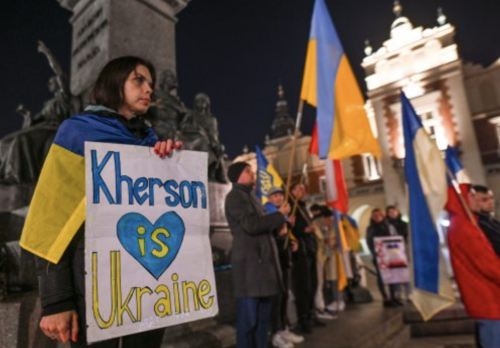

Photo: Atlantic Council
By Alexa Castruita
UKRAINE—Recently, Russian forces pulled out of a large portion of Ukraine’s Kherson region, signaling a defeat against the Kremlin and a step closer to Ukraine’s rightful sovereignty from Russian control.
Kherson, located in southern Ukraine, was touted as one of the four regions that Putin and Russian forces had illegally annexed a little over a month ago (this annexation is still unrecognized by international powers—save for North Korea). Kherson was not only physically occupied by the Russians, but it also became a prime example of Russia’s attempts to force assimilation upon Ukrainian residents. The Soviet state pushed nationalist propaganda within Ukrainian schools and neighborhoods throughout the city.
Initially, Ukrainian officials believed that the retreat was a possible tactic meant to trick the Ukrainians into being ambushed by the Russians, following orders from the Russian Defense Minister for troops to evacuate the area. The Ukrainian forces were skeptical, entering the city discreetly before safely reaching the city center, providing a much-needed sense of security and relief to the Ukrainian citizens still residing there. Social media posts displayed the celebration among Ukrainians, reinforcing their faith in their unfading efforts against Russia.
The retreat comes in the midst of Ukraine’s southern counteroffensive strategic plans, where they have laid out their efforts to expel Russian forces by reclaiming villages and towns bit by bit. Around 40 percent of Kherson’s region has been reclaimed by Ukraine.
President Volodymyr Zelensky announced to Ukrainians in an address that their combative efforts against Russian forces had produced a significant victory for their nation, presenting Kherson’s independence from Russian control. Zelensky thanked the countless “defense forces who are making this offensive operation in the south possible,” also reaffirming to Ukrainians that the state “will restore all conditions of normal life—as much as possible.”
Zelensky separately addressed Russian forces, as well. He extended a threat that if there were any still within the Kherson region, that their “only chance for salvation for you is to surrender to Ukrainian captivity.”
Ukrainian forces have begun to establish support and aid for residents within the recaptured portions of Kherson, restoring electrical power and essentials to the city as the post-retreat liberation continued on. Amid fears that Russian forces left behind dangerous mines within the city, Ukrainian officials have consistently warned residents to be wary and cautious as they moved around the region. These warnings were also extended to residents regarding the possibility of Russian soldiers abandoning their military gear and donning civilian clothing in efforts to infiltrate the town.
The city did face extensive damage, reporting up to seven transportation-essential bridges having been destroyed. Civilian buildings have been completely demolished and in other regions, state investigators have been conducting reports into allegations of sexual violence from Russian forces toward Ukrainian civilians.
The Russo-Ukraine conflict began in February of 2014, but in that same month of 2022, the situation completely escalated following months of tension the year before, as Russia invaded various parts of the Ukrainian nation. Civilians were rushed out of their homes as Russian forces began to exercise heavy military agency and cities were left destroyed, completely unrecognizable from mere days before the escalation.
Since February of 2022, Ukrainian forces have consistently struggled against the Russians, but have received support from NATO’s powerhouses in the form of political and military assistance. This much larger conflict consequently created a surge of refugees seeking asylum in neighboring European nations and further western countries. The Biden administration announced that they had the capacity to offer asylum to upwards of 100,000 refugees, 71,000 of which have successfully made their way to the States.
As for support strategies from outside countries, many nations placed sanctions on Russian goods in attempts to create some sort of economic pressure on the Soviet nation. The U.S. itself has explored approaches to conflict resolution, but divides between plans within the administration have halted any advancement on policy.
Sources say that while President Biden and other top officials like Secretary Blinken believe military forces are necessary in the situation, figures such as Chairman of the Joint Chiefs of Staff Mark Milley have instead insisted upon peaceful negotiations being pursued between Ukraine and Russia. These deliberations come at the same time as the U.S. has bought artillery ammunition they intend to distribute to Ukraine in efforts to support their military strength.
With the external support of western powers comes the opportunity for Ukraine to further progress in their combat against Russia’s invasion, but government officials from these western powers maintain that they cannot encourage or push Ukraine into seeking or not seeking negotiations with Russia. This, however, has not stalled Ukrainian faith and pride as troops continue to recapture and reclaim previously invaded regions.
Additionally, Russian officials refused to publicly comment on this retreat as a “humiliation” for President Putin and his forces. They instead pointed to this strategy being necessary to protect the lives of their own troops and to maintain a control over the limited supplies they had available.
For Ukraine, this is a major victory in the conflict. In September, Ukrainian forces were also able to gain ground through the region of Kharkiv—both of these victories are a result of the nation’s highly developed counteroffensive strategy and previous military tactics through the last few months that have set up Ukraine’s ability to capitalize on Russian weaknesses.
In a parting message in his address, President Zelensky reassured the Ukrainian public of the state’s relentless fight against Russian occupation, thanking supporters and exclaiming “eternal memory to all those whose lives were taken by the occupiers.”




